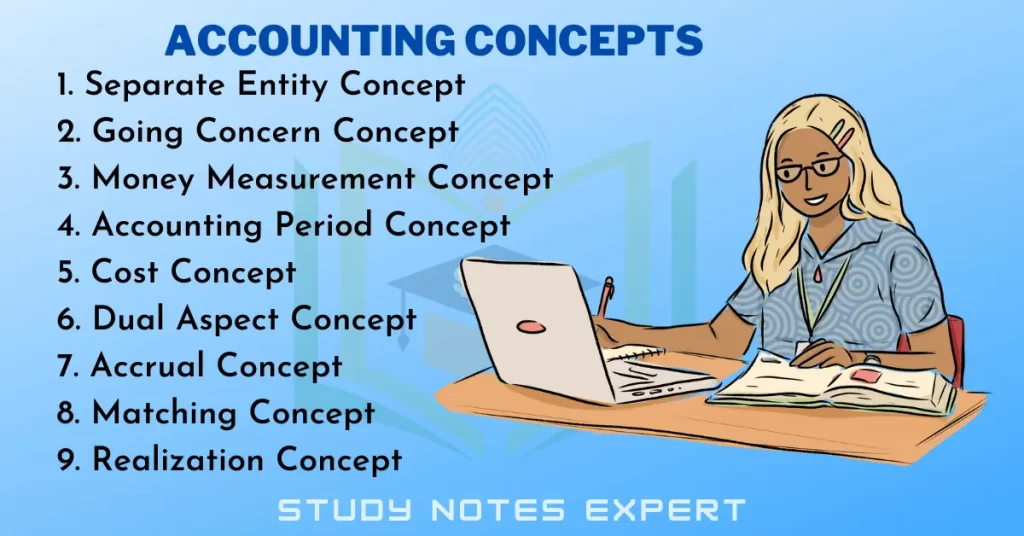Here, in this article, will come to know the accounting principles. Also, you will learn the components and types of accounting principles. These are two types of accounting concepts and accounting conventions. For detailed information, you have to follow the following article till to the end.
Accounting Principles or Concepts

1. Separate Entity Concept
There is a presumption under ‘Separate Entity Concept’ that as far as accounting is concerned, the ‘owners of a business organization’ and the ‘business organization itself’ are two independent and separate entities. The business transactions undertaken by the owner are altogether different from the personal transactions undertaken by him.
2. Going Concern Concept
Going concerned is one of the fundamental assumptions in accounting based on which financial statement is prepared. The assumption is a business entity will continue to operate in the foreseeable future without the need or intention of management to liquidate the entity. Therefore, it will realize the assets and settle its obligations in the normal course of the business. It means that every business entity has continuity of life, and it will not be dissolved shortly.
3. Money Measurement Concept
In accounting, every transaction is recorded in money, i.e., rupees and paisa in India. Receipt of income, payment of expenses, purchase, sale of assets, etc. are monetary transactions. Therefore, they are records in the books of accounts. Accounting principles major pillar is money measurement.
4. Accounting Period Concept
An accounting period is when the financial statements are prepared to ascertain a company’s economic performance. The preparation of financial statements at periodic intervals helps take timely corrective action and develop appropriate strategies. Moreover, the accounting period is generally twelve months, although it may be for three months or six months in case of a new startup. Preparation of financial statements works as profit calculation, tax calculation, submission of reports to regulators and other Government agencies, etc.
5. Cost Concept
The cost of an asset is recorded in the books of accounts at a price paid to acquire it and not at the market price.
6. Dual Aspect Concept
This concept follows from the entity concept. All entities have certain assets. Also, such assets are need to contribute who have provided the funds for the purpose.
Assets This = Owner’s Funds (Capital and Reserves) + Liabilities Or Owner’s Funds = Asset – Liabilities.
7. Accrual Concept
It is also important for accounting principles. Under the cash accounting system, the income and expenditure are recorded only if there is an actual receipt of payment in cash, irrespective of the accounting period to which they belong.
8. Matching Concept
The matching concept is an outcome drawn from the accrual concept. It emphasizes that the revenue earned and the expenditure incurred must belong to the same accounting period. The ascertain the surplus or deficit that creates the business entity during an accounting period. The costs incurred must match with the revenue earned by the entity during the accounting period.
9. Realization Concept
Revenue needs to be accounted for only when it is realized, or it has become certain revenue will be realized. However, the actual receipt of cash is not necessary to recognize payment.
Accounting Conventions

1. Consistency
The convention of consistency emphasizes the entities of accounting principles/practices. It should be consistent over the years to achieve compatibility. There are several methods for evaluating inventories, ‘First In First Out (FIFO), ‘Last In First Out (LIFO), or Weighted Average Method.
2. Full Disclosure
The term “disclosure” implies that there must be a sufficient exposure of information which iso material interest to all the stakeholders, viz. owners, creditors, lenders, investors, public, etc. The accounts and the financial statements of an entity should disclose full and fair information to the beneficiaries to form a correct opinion on the performance of such an entity, which would allow them to make informed and accurate decisions.
3. Convention of Conservatism (or Prudence)
This means a cautious approach or policy of having a conservative approach. According to this convention, the anticipated profits need to ignore, and the losses expected need to provide for books of accounts of an entity. Without this convention, accounting principles are not much effective.
4. Materiality
The term material refers to the relative importance of an item or event. An item should be regarded as material if there is a sufficient reason to believe that knowledge of it would influence the decision of informed creditors, lenders, investors, the public, and other stakeholders.

